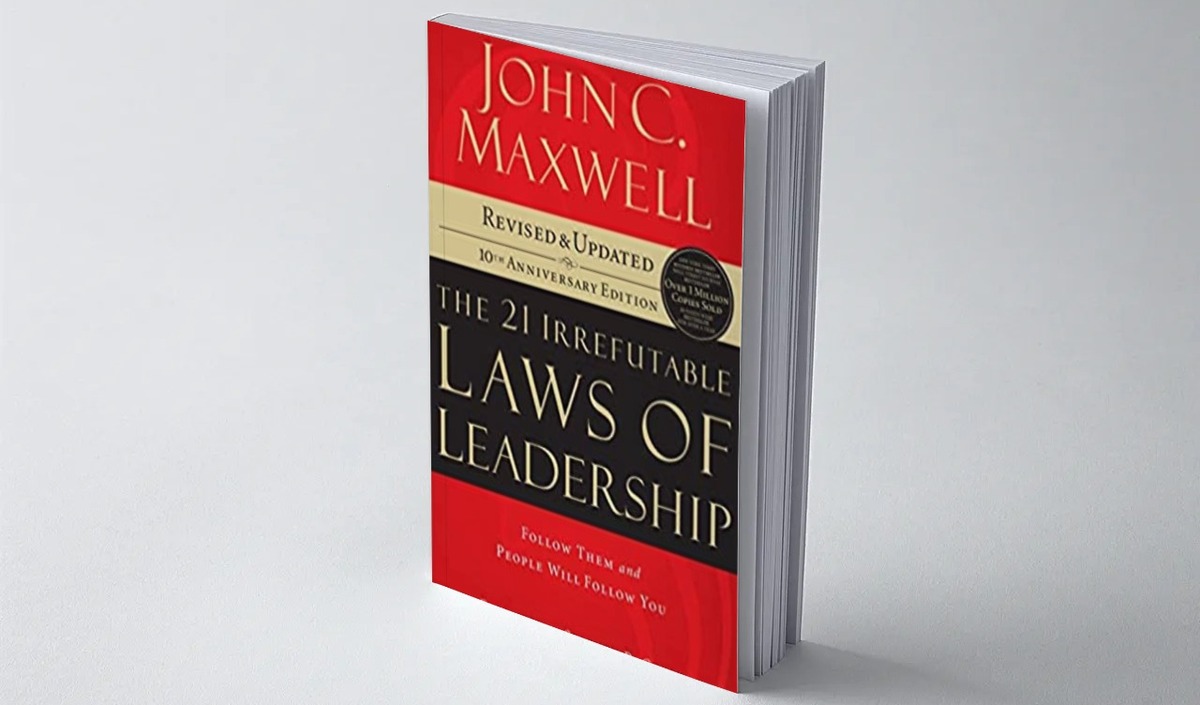NEXT ELITE SOCCER COACHING AWARD COHORT STARTS FEBRUARY 16 - ENROL NOW
How to get serious about being a leader
To think that there are as many 21 Laws of Leadership is quite a daunting thought. But if you are going to be a leader and good one at that, then this is the size of the task. John Maxwell, who wrote this bestseller, knows right from the first to the last Law, that if you are serious about making people follow you, you have to get serious about being a leader.
I don’t need to prove the value of this book to coaches who want to improve themselves. It comes highly recommended by leaders from all walks of life. Though it is aimed at business, the Laws are equally applicable to sport and, indeed, Maxwell draws on experiences from the NBA and NFL to illustrate certain points.
I am going to offer you an executive summary of the book. It should whet your appetite to drill down into the ideas and see what you can draw from them. It is an easy book to read and you can drop in and out of the Laws without having to follow one to another. As is the case these days with most self-help books, it comes with summaries and checklists. It is also worth noting that the latest addition is updated and includes some of the more recent management thinking.
Summary
1. The Law of the Lid
I think that boards of directors at soccer clubs take the idea of the ‘lid’ too literally. It says that the organisation can be held back by the leadership. It might be better to get a new leader who can grow the team, than expect the leader to grow. If you want your team to grow, you need to grow as a leader (before you get sacked!).
2. The Law of Influence
You need to create change. You do this by influencing people and they must follow you. Get the followers to participate. “He who thinks he leads but has no followers is only taking a walk”.
3. The Law of Process
You can learn to be a leader. You have to absorb these skills: Dealing with people, emotional strength, vision, momentum and timing. You do not stop learning. You need to work on it daily, like Larry Bird who became the best free throw shooter in the NBA by throwing 500 shots every day before breakfast.
4. The Law of Navigation
You are not simply steering the ship, you are setting the course. You must see the end destination, recognise the obstacles ahead. You are well prepared, both optimistic and realistic.
5. The Law of Addition
You add value to your team by serving others. You need to ask the question whether you are making things better for the people who follow you. You can only be doing that if you know you are doing it. You can do this by truly valuing others, making yourself more valuable to others, knowing and relating to what others value.
6. The Law of Solid Ground
Trust is the foundation of leadership. If you continually break the trust of others, they will not follow you. Your team will know when you make mistakes, so you need to acknowledge these errors to help them regain your trust. To build trust you need to display competence, connection and good character. You should be someone they can rely on, and puts others ahead of themselves.
7. The Law of Respect
The team will follow you if they feel you are stronger than them. Not necessarily more skilful, but showing leadership qualities such as vision, respect for others, courage, success, loyalty and adding value to others.
8. The Law of Intuition
You need to evaluate all your decisions with a leadership bias. Therefore you should be able to read the situation, read the trends, read the resources, read the people, read yourself. With all this at your disposal, you will have better intuition and won’t get blindsided.
9. The Law of Magnetism
Who you are is who you attract. If want to attract better people, you should become the sort of person you want to attract.
10. The Law of Connection
You have to connect with people if they are going to follow you. You cannot move them if you cannot first move them emotionally. You can connect with people by first connecting with yourself. If you don’t believe in yourself then why will anyone else believe in you?
Then you have to open and honest, know who you are talking to and practise what you preach.
11. The Law of the Inner Circle
You can lead with others to help you. And you need a strong group around you. They are able to influence others, add something else that you don’t possess, want to work with you and have a positive impact with you and the others in the group.
12. The Law of Empowerment
Empowerment is a common theme for soccer coaches. You need to be able to give power away to gain more authority.
13. The Law of the Picture
People do what people see. You should give a vision, a vision that the team can feel they can achieve. That helps overcome problems in the short run.
14. The Law of the Buy-In
Again it is a well-worn axiom for soccer coaches - you want the followers to buy-in to your vision. But to do that, they need to buy-in to you first. You have to be a worthy leader. Once you have proved yourself, you can then provide the vision.
15. The Law of Victory
It is rare to find an uncompetitive soccer coach. You need to channel that into a constant desire to win, never giving up, and having a plan B should plan A fail because you never stop fighting. You have to engender a unity of vision within your team. Then you have to provide the motivation, empowerment and direction to win.
16. The Law of the Big Mo
Momentum in a game of soccer often means that your team can handle pressure, apply pressure and press home any advantage. Small reverses are quickly forgotten, because the team believes it is moving in the right direction. If you can create this off the pitch, you will be able to build an even stronger, more successful team. With momentum you make bolder decisions, steer rather than start initiatives and motivate players more easily.
Momentum is your responsibility. You cannot wait for it, you have to use your vision and energy to create it. That comes from your passion and enthusiasm.
17. The Law of Priorities
Being busy does not mean being successful. You need to pick the right activities to work on now, ones which will give your team the greatest benefit. You should also ask yourself: What must I do that nobody can or should do for me? Delegate when someone else can do the work, eliminate what does not need to be done.
18. The Law of Sacrifice
You will need to give up to go up. There will be areas of your life that will have to take a back seat. There is a cost of leadership: Your rights diminish as your responsibilities increase.
19. The Law of Timing
There are four possible outcomes when you make a decision and they can be based on the timing of your decision: Wrong action at the wrong time, the right action at the wrong time which leads to resistance, the wrong action at the right time leading to a mistake and finally success with right time, right action.
Be prepared, use your experience, be confident and decisive.
20. The Law of Explosive Growth
You can improve the team by leading followers. You can maximise your leadership by leading leaders.
21. The Law of Legacy
Your lasting value is measured by your legacy. What will happen when you leave the team is what you need to think about. You can do this by living the legacy you want to leave. And if you can, try to choose people who can take on your role when you leave. Probably more significant will be your legacy with individuals who you coached. They will be able to tell others what you did for them. What would you like them to say?
The 21 Irrefutable Laws of Leadership, John C Maxwell.
Editor's Picks
Attacking transitions
Deep runs in the final third
Using the goalkeeper in build-up play
Intensive boxes drill with goals
Penetrating the final third
Creating and finishing
My philosophy
Pressing initiation
Compact team movement
Coaches' Testimonials

Alan Pardew

Arsène Wenger

Brendan Rodgers

Carlos Carvalhal

José Mourinho

Jürgen Klopp

Pep Guardiola

Roy Hodgson

Sir Alex Ferguson

Steven Gerrard
Coaches' Testimonials

Gerald Kearney, Downtown Las Vegas Soccer Club

Paul Butler, Florida, USA

Rick Shields, Springboro, USA

Tony Green, Pierrefonds Titans, Quebec, Canada
Join the world's leading coaches and managers and discover for yourself one of the best kept secrets in coaching. No other training tool on the planet is written or read by the calibre of names you’ll find in Elite Soccer.
In a recent survey 92% of subscribers said Elite Soccer makes them more confident, 89% said it makes them a more effective coach and 91% said it makes them more inspired.
Get Monthly Inspiration
All the latest techniques and approaches
Since 2010 Elite Soccer has given subscribers exclusive insight into the training ground practices of the world’s best coaches. Published in partnership with the League Managers Association we have unparalleled access to the leading lights in the English leagues, as well as a host of international managers.
Elite Soccer exclusively features sessions written by the coaches themselves. There are no observed sessions and no sessions “in the style of”, just first-hand advice delivered direct to you from the coach.








